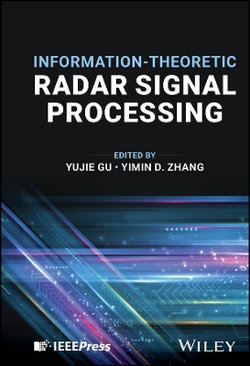A comprehensive introduction to the emerging research in information-theoretic radar signal processing
Signal processing plays a pivotal role in radar systems to estimate, visualize, and leverage useful target information from noisy and distorted radar signals, harnessing their spatial characteristics, temporal features, and Doppler signatures. The burgeoning applications of information theory in radar signal processing provide a distinctive perspective for tackling diverse radar signal processing challenges, including optimized waveform design, performance bound analysis, robust filtering, and target enumeration.
Information-Theoretic Radar Signal Processing provides a comprehensive introduction to radar signal processing from an information theory perspective. Covering both fundamental principles and advanced techniques, the book facilitates the integration of information theory into radar signal processing, broadening the scope and improving the performance. Tailored to the needs of researchers and students alike, it serves as a valuable resource for comprehending the information-theoretic aspects of radar signal processing.
Information-Theoretic Radar Signal Processing readers will also find:
- Presentation of alternative hypotheses in adaptive radar detection
- Detailed discussion of topics including resource management and power allocation
- Direction-of-arrival (DOA) estimation and integrated sensing and communications (ISAC)
Information-Theoretic Radar Signal Processing is ideal for faculties, graduate students, scientists, researchers, and engineers, who work on the broad scope of radar and sonar applications, including target detection, estimation, imaging, tracking, and classification using radio frequency, ultrasonic, and acoustic methods.




Share This Book: